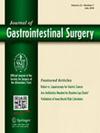胰腺手术共同决策的决策遗憾和满意度。
IF 2.2
3区 医学
Q3 GASTROENTEROLOGY & HEPATOLOGY
引用次数: 0
摘要
背景:胰腺手术通常无法为癌症患者带来长期生存,也无法持续改善良性疾病患者的症状。本研究旨在评估胰腺切除术患者的决策后悔度和对决策过程的满意度:本研究对 2021 年至 2023 年期间接受择期胰腺切除术的所有患者实施了布雷豪特决策后悔量表(DRS)、9 项共同决策问卷(SDM-Q-9)和欧洲癌症研究和治疗组织核心生活质量问卷(EORTC QLQ-C30)。决策后悔的定义是 DRS >25。此外,本研究还评估了有遗憾和无遗憾患者的 SDM-Q-9 反应:本研究共纳入 143 名患者,其中 71 名患者(49.6%)完成了分发的调查问卷。应答者和未应答者的人口统计学、病理学和主要并发症发生率相似。手术适应症为恶性肿瘤(67.6%)和良性疾病(32.4%)。18.3%的患者在胰腺手术后后悔做出决定。出现后悔的患者年龄较小(50.8 ± 18.7 岁[年轻组] vs 62.0 ± 14.9 岁[年长组];P = .03),更有可能患有良性疾病(39.1% [良性疾病] vs 8.3% [恶性疾病];P在接受胰腺切除术的患者中,有 18% 的人表示对手术决定非常后悔。年龄较小、胰腺远端切除术、良性适应症和主要术后并发症与后悔有关。SDM-9 的数据强调了可能需要改进的地方,以帮助患者做出符合其护理目标的决定。本文章由计算机程序翻译,如有差异,请以英文原文为准。
Decision regret and satisfaction with shared decision-making in pancreatic surgery
Background
Pancreatic surgery often does not provide long-term survival in patients with cancer or consistently improve symptoms in benign disease. This study aimed to assess decision regret and satisfaction with the decision-making process among patients who underwent pancreatectomy.
Methods
This study administered the Brehaut Decision Regret Scale (DRS), 9-Item Shared Decision-Making Questionnaire (SDM-Q-9), and the European Organization for Research and Treatment of Cancer Core Quality of Life Questionnaire (EORTC QLQ-C30) to all patients who underwent elective pancreatectomies from 2021 to 2023. Decision regret was defined as a DRS of >25. In addition, this study evaluated SDM-Q-9 responses in patients with and without regret.
Results
A total of 143 patients were included in this study, of whom 71 patients (49.6%) completed the distributed surveys. Demographics, pathology, and major complication rates were similar between responders and nonresponders. The indications for surgery were malignancy (67.6%) and benign disease (32.4%). Decision regret after pancreatic surgery was reported in 18.3% of patients. Patients who experienced regret were younger (50.8 ± 18.7 years [younger group] vs 62.0 ± 14.9 years [older group]; P = .03), more likely to have benign disease (39.1% [benign disease] vs 8.3% [malignant disease]; P < .01), underwent a distal pancreatectomy (34.5% [distal pancreatectomy] vs 7.7% [pancreaticoduodenectomy]; P = .02), or experienced a major complication (36.8% [major complication] vs 11.5% [no major complication]; P = .03). Patients with regret had lower global health (57.1 ± 20.1 [patients with regret] vs 76.2 ± 22.2 [patients without regret]; P < .01) and social function scores (61.5 ± 31.5 [patients with regret] vs 77.6 ± 22.0 [patients without regret]; P = .03) on the EORTC QLQ-C30. Patients with regret were less satisfied with the shared decision-making process.
Conclusion
Strong decision regret was reported in 18% of patients who underwent pancreatectomy. Younger age, distal pancreatectomy, benign indications, and major postoperative complications were associated with regret. Data from the SDM-9 highlight areas for potential improvement to help patients make decisions aligned with their goals of care.
求助全文
通过发布文献求助,成功后即可免费获取论文全文。
去求助
来源期刊
CiteScore
5.50
自引率
3.10%
发文量
319
审稿时长
2 months
期刊介绍:
The Journal of Gastrointestinal Surgery is a scholarly, peer-reviewed journal that updates the surgeon on the latest developments in gastrointestinal surgery. The journal includes original articles on surgery of the digestive tract; gastrointestinal images; "How I Do It" articles, subject reviews, book reports, editorial columns, the SSAT Presidential Address, articles by a guest orator, symposia, letters, results of conferences and more. This is the official publication of the Society for Surgery of the Alimentary Tract. The journal functions as an outstanding forum for continuing education in surgery and diseases of the gastrointestinal tract.

 求助内容:
求助内容: 应助结果提醒方式:
应助结果提醒方式:


